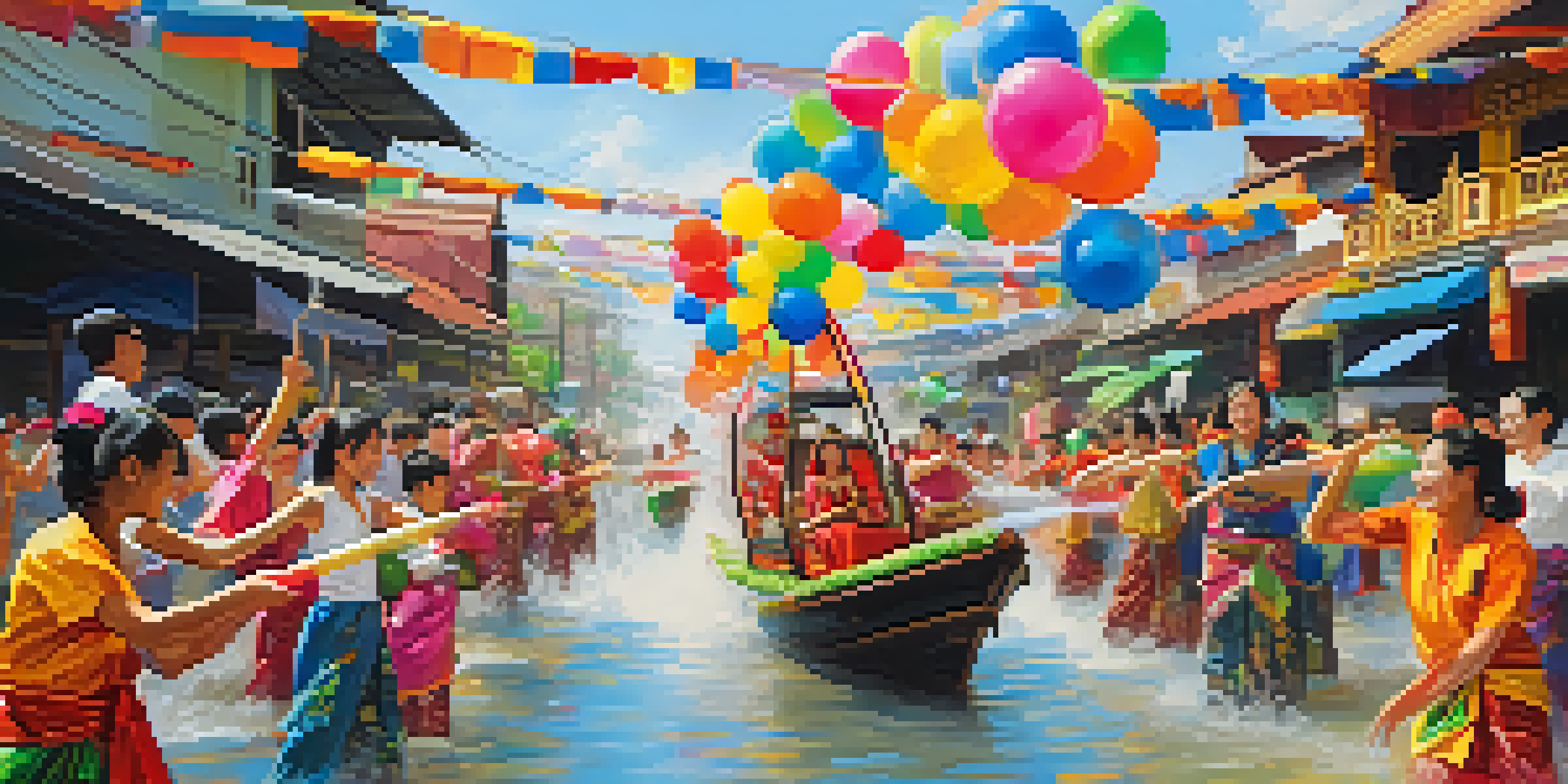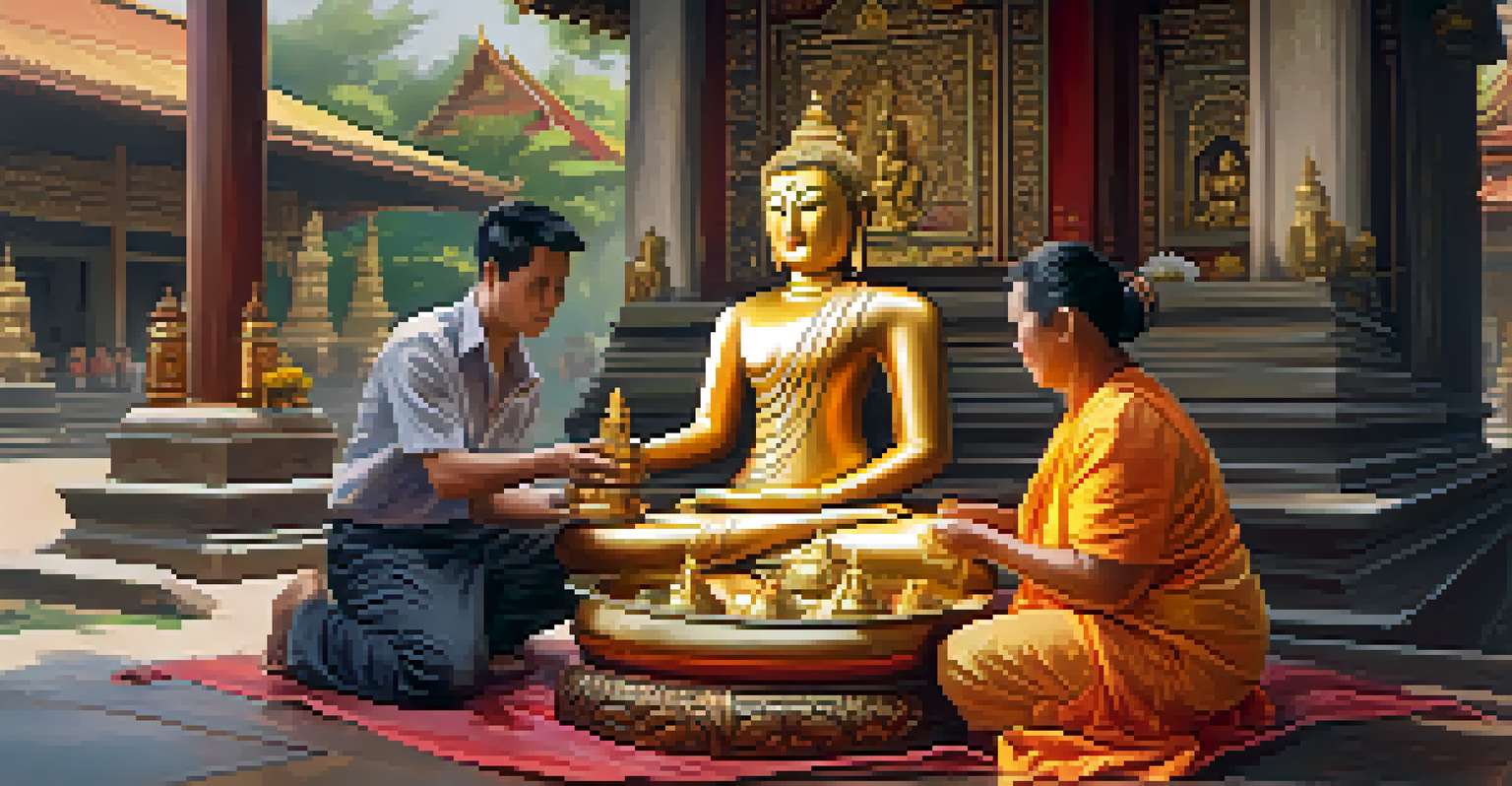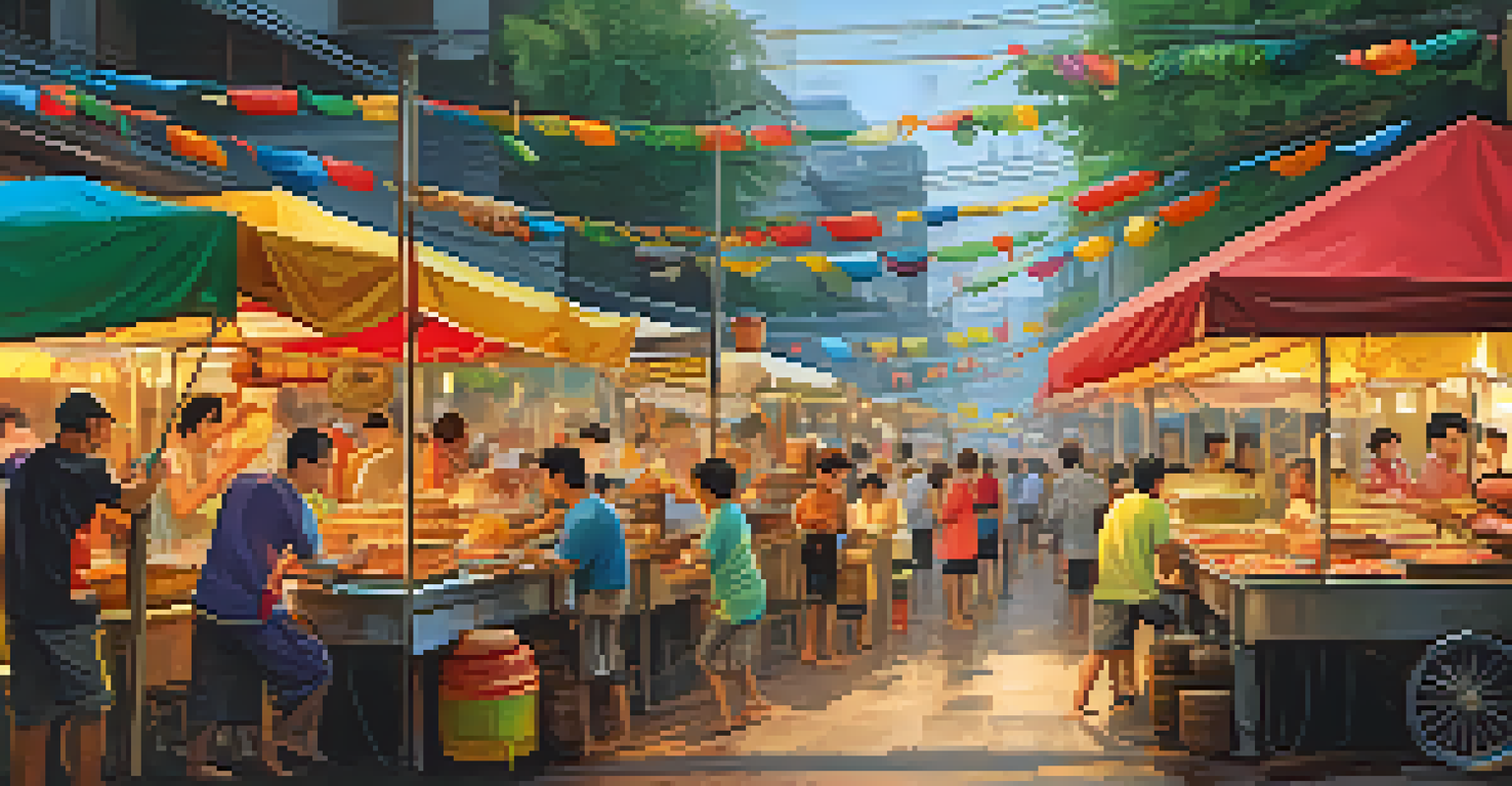Unique Customs of Songkran: Rituals and Practices Explained

The Significance of Songkran: A New Year Celebration
Songkran, celebrated in mid-April, marks the traditional Thai New Year. This vibrant festival symbolizes renewal and the washing away of the old year’s misfortunes. Families come together to honor their ancestors and express gratitude for the past year. It's a time of reflection and setting intentions for the year ahead.
Water is the source of life, and it is also the source of renewal for the soul.
The festival is deeply rooted in Buddhist traditions, where many visit temples to make merit and pour water over Buddha statues. This act is believed to bring good luck and blessings. Through these rituals, participants cultivate a sense of community and spirituality.
For many, Songkran is not just a holiday; it’s a cultural experience that showcases Thailand's rich heritage. The lively celebrations, family gatherings, and the spiritual essence of the festival create an atmosphere of joy and connection.
Water Blessings: The Heart of Songkran
One of the most iconic aspects of Songkran is the water pouring rituals. Water symbolizes purification and the cleansing of sins, making it central to the celebrations. People gently pour water over the hands of elders and family members as a sign of respect and to seek blessings.

In recent years, this intimate tradition has evolved into large-scale water fights in the streets, where people of all ages participate in playful splashes. While the fun is contagious, the underlying message of respect and reverence remains. It’s a fascinating blend of tradition and modern celebration.
Songkran Celebrates Renewal
This vibrant festival marks the traditional Thai New Year, symbolizing renewal and the washing away of the past year's misfortunes.
This joyful water play not only brings excitement but also fosters a sense of unity among participants. Regardless of age or background, everyone joins in the fun, creating lasting memories and strengthening community bonds.
Rituals of Respect: Paying Homage to Ancestors
During Songkran, honoring ancestors plays a vital role in the festivities. Many families create sand pagodas at temples, symbolizing the return of soil to the earth, which is a way of giving back to the land. This practice reflects respect for one’s roots and the cyclical nature of life.
Tradition is not the worship of ashes, but the preservation of fire.
Another touching tradition involves the pouring of scented water over Buddha statues and family pictures. This act is intended to wash away negative energy and is a way to connect with loved ones who have passed. It serves as a reminder to cherish family ties and the memories of those who came before us.
These ancestral rituals not only deepen familial connections but also reinforce cultural values of respect and gratitude. They provide a moment of pause amidst the joyful celebrations, allowing participants to reflect on their heritage.
The Role of Food: Culinary Delights of Songkran
No celebration is complete without food, and Songkran is no exception. Traditional dishes like 'Khao Chae' (rice soaked in iced water) are served, offering a refreshing taste during the hot season. This dish is not only delicious but also holds cultural significance, representing the essence of the festival.
Street food stalls abound during Songkran, featuring a variety of local delicacies. From spicy papaya salad to sweet mango sticky rice, the festival is a feast for the senses. Families often gather to share meals, reinforcing the spirit of togetherness and celebration.
Water Rituals Foster Unity
The water pouring rituals, a blend of tradition and modern celebration, promote respect and unity among participants of all ages.
The culinary traditions of Songkran highlight the importance of food in Thai culture. Meals become a medium for sharing stories, laughter, and love, making the festival a holistic experience that engages all senses.
Songkran Parades: A Colorful Display of Culture
One of the highlights of Songkran is the vibrant parades that take place across the country. Floats adorned with flowers and traditional decorations showcase Thailand’s rich cultural heritage. Participants often dress in colorful traditional attire, adding to the festivities' visual splendor.
In many towns, locals join together to perform traditional dances and music, creating an atmosphere of joy and celebration. These performances not only entertain but also educate younger generations about their cultural roots. It’s a lively reminder of the importance of preserving traditions.
The parades serve as a gathering point for communities to come together and celebrate their identity. They foster a sense of pride and connection, making Songkran an unforgettable experience for both locals and visitors.
Unique Customs Across Regions: A Diverse Celebration
While the essence of Songkran remains consistent, unique customs emerge in different regions of Thailand. For instance, in Chiang Mai, the festival is celebrated with large-scale water fights in the streets, making it a popular destination for tourists. The city’s historic temples also attract visitors seeking to partake in traditional rituals.
In contrast, regions like Isaan may showcase more local variations, including traditional music and games. These distinct practices highlight the diversity of Thai culture, demonstrating how one festival can bring various expressions of joy and heritage.
Culinary Traditions Enrich Festivities
Food plays a crucial role in Songkran, with traditional dishes enhancing the spirit of togetherness and cultural appreciation during the celebrations.
This regional diversity enriches the Songkran experience, allowing visitors to explore the unique flavors of Thai culture. Each area offers something special, making it a celebration that unites the nation while honoring its local traditions.
Environmental Awareness: A Modern Twist to Tradition
In recent years, environmental awareness has become a focal point during Songkran celebrations. With the increase in water usage and waste generation, many communities are adopting eco-friendly practices. Events are organized to promote sustainable water usage and reduce plastic waste.
Some cities encourage the use of biodegradable materials for floats and decorations, emphasizing the importance of preserving nature. This shift reflects a growing mindfulness among participants about the impact of their celebrations on the environment.

By integrating sustainability into the festivities, Songkran evolves to meet contemporary challenges while maintaining its cultural significance. This modern twist ensures that future generations can continue to enjoy and celebrate this cherished festival.
Embracing the Spirit of Songkran: A Time for Reflection
As Songkran draws to a close, it offers an opportunity for reflection and gratitude. Many people take a moment to consider the blessings they’ve received over the past year and the lessons learned. This introspective aspect adds depth to the otherwise lively celebrations.
The festival encourages individuals to set intentions for the year ahead, fostering personal growth and mindfulness. It’s not just about the festivities; it’s about carrying the spirit of Songkran into daily life.
In a fast-paced world, Songkran serves as a reminder to pause, reconnect with loved ones, and appreciate the beauty of life. This unique blend of celebration and reflection makes Songkran a truly special experience for everyone involved.